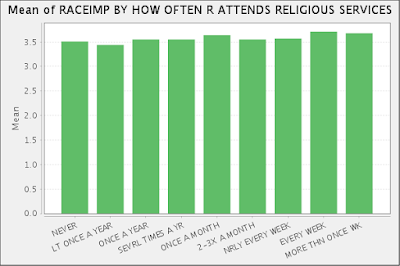With the rise of militant, celebrity atheists, quite a bit of attention has been devoted to data that show that atheists tend to be smarter than theists. Race realists are likely to rely on IQ to explain the greater religiosity of blacks and Hispanics.
I can think of another factor that might help explain these patterns: having a sense of control over one's fate, called
locus of control by psychologists. As a religious person myself, I see that some people get interested in religion when they feel helpless. They turn to God when there is trouble they can't seem to handle. Many of my irreligious colleagues seem very in charge of their lives; they've got it all under control.
I've also read research that indicates that poor minorities tend to feel that they do not control their life outcomes. This is called an external locus of control. Maybe this sense of vulnerability explains their stronger belief in God.
The General Social Survey asked respondents, "Do you agree or disagree with the following: We each make our own fate." Answers ranged from "strongly agree" (1) to "strongly disagree" (5).
They were also asked about their confidence in the existence of God with responses ranging from "don't believe" (1) to "know God really exists and have no doubts about it" (6). As a first step, let's use OLS regression analysis to see if race is linked to belief in God and locus of control (sample size = 741):
Confidence in the existence of God (standardized OLS coefficients)
Black
.13***
Hispanics did not differ from whites significantly in belief in God, so we'll focus on blacks. They have greater confidence in God's existence.
External locus of control
Black .
06**
Compared to non-blacks, blacks are more likely to think they do not make their own fate. Now let's look at race, IQ, and belief.
Confidence in the existence of God
IQ
-.16***
As expected, we see IQ is associated with more doubting, but the correlation is weak.
Confidence in the existence of God
Black
.10***
IQ
-.14***
Recall how the black estimate for belief was .13 when only race was entered into the model. We see that when IQ is added, the black coefficient shrinks but does not disappear. This indicates that some of the greater belief by blacks is explained in terms of lower IQ, but much of the gap remains unexplained. Let's add locus of control:
Confidence in the existence of God
Black
.00
IQ
-.14***
External locus of control
.18***
When external locus of control is added, the race coefficient drops to zero. Much of the reason why blacks are more likely to believe in God is because of a sense of helplessness. And when it comes to predicting belief, an external locus of control is more powerful than IQ.
This is a reminder than while HBD-ers are right to focus on intelligence, there are other consequential traits. Moreover, there is evidence that locus of control, like practically all psychological traits, is genetically influenced. According to this
twin study, about 1/3 of the variation of a sense of control over your own life is due to genes.









